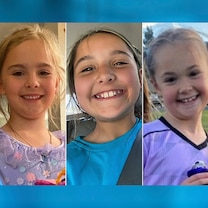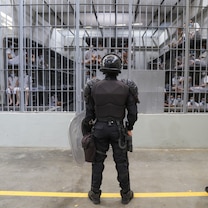Abrego Garcia still in custody as judge asks if DOJ can prevent his deportation while awaiting trial
Kilmar Abrego Garcia appeared Wednesday at a hearing in Tennessee.
Kilmar Abrego Garcia, who was brought back to the U.S. after being mistakenly deported to his native El Salvador, remained in custody Wednesday after the judge overseeing the federal government's human smuggling case against him ordered Abrego Garcia's attorneys and the Justice Department to file briefs on whether the government has the ability to prevent his deportation while he awaits trial.
U.S. Magistrate Judge Barbara Holmes initially said she would enter a separate order requiring Robert McGuire, the Acting United States Attorney for the Middle District of Tennessee, to "make best efforts" to ensure cooperation between the DOJ and DHS to ensure Abrego Garcia is not deported and that he can attend his court proceedings in person.
But after Abrego Garcia's attorney pointed to a brief filed on Tuesday by McGuire that said he was concerned that immigration authorities would seek to deport Abrego Garcia, Judge Holmes ordered both parties to file a brief on the issue.
Abrego Garcia appeared at the court hearing in Tennessee that was to address the conditions of his release after Judge Holmes on Sunday ordered that he should not be detained while he awaits a federal trial on human smuggling charges.
Had Abrego Garcia been released by the judge, agents with U.S. Immigration and Customs Enforcement were expected to take him into custody due to an immigration detainer the government has on him.
Sean Hecker, one of Abrego Garcia's attorneys, argued during the hearing that "the unusual circumstances of this case suggest a level of coordination between DOJ and DHS." Hecker also raised concerns about the possibility of Abrego Garcia being sent to a detention center in Louisiana or Texas.
In response to Hecker's concerns, McGuire said he would "try to coordinate as best" as he can with DHS. But, he said, "It is a separate agency with separate leadership. I will coordinate but I can't tell them what to do."

Hecker pushed back, saying the government secured witness cooperation for its case from undocumented individuals by ensuring they will not be deported.
Judge Holmes ordered Abrego Garcia's attorneys to file a brief on the issue by Thursday and ordered the government to respond by Friday.
Judge Holmes also reviewed the conditions of release should Abrego Garcia be released from ICE custody, as follows: Abrego Garcia cannot talk to any known members of the MS-13 criminal gang; he must remain in home detention; he would have to reside with his brother, instead of his wife and child with whom he had been living in Maryland; and he must get "anger management" counseling.
Separately, the district judge who will oversee his case, Judge Waverly Crenshaw, denied the government's request to stay the order of release.
"Underlying this case in an obvious truism that must not be forgotten: the Executive Branch is in control of where Defendant Kilmar Armando Abrego Garcia awaits trial in this case," Crenshaw said. "This is true because the Executive Branch can elect whether to hold him for pending deportation proceedings or not."
Abrego Garcia has been the subject of a prolonged legal battle since he was deported in March to El Salvador's CECOT mega-prison -- despite a 2019 court order barring his deportation to that country due to fear of persecution -- after the Trump administration claimed the undocumented immigrant was a member of the criminal gang MS-13, which his family and attorneys deny.
The Trump administration, after arguing for nearly two months that it was unable to bring him back, returned him to the U.S. earlier this month to face charges of allegedly transporting undocumented migrants within the U.S. while he was living in Maryland. He has pleaded not guilty to the charges.
In Sunday's 51-page ruling, Judge Holmes raised questions about some of the evidence the government presented during a June 13 hearing -- much of which she said consisted of "general statements, all double hearsay from two cooperating witnesses."
Statements from the two witnesses about Abrego Garcia's alleged MS-13 membership contradicted each other, Holmes said. One cooperating witness, according to the special agent who testified during the hearing, said that the Salvadoran "may belong to MS-13." But a second witness, according to the special agent, said that in ten years of acquaintance with Abrego Garcia, there were no signs or markings, including tattoos, indicating that he is a member of MS-13.
"Even without discounting the weight of the testimony of the first and second male cooperators for the multiple layers of hearsay, their testimony and statements defy common sense," Holmes said.
"The government alleges that Abrego is a longtime, well-known member of MS-13, which the Court would expect to be reflected in a criminal history, perhaps even of the kind of violent crimes and other criminal activity the government describes as typically associated with MS-13 gang membership," Holmes said. "But Abrego has no reported criminal history of any kind."
Statements from the cooperating witnesses introduced during the June 13 hearing accused Abrego Garcia of trafficking drugs and firearms and of abusing women and minors that he allegedly transported.



